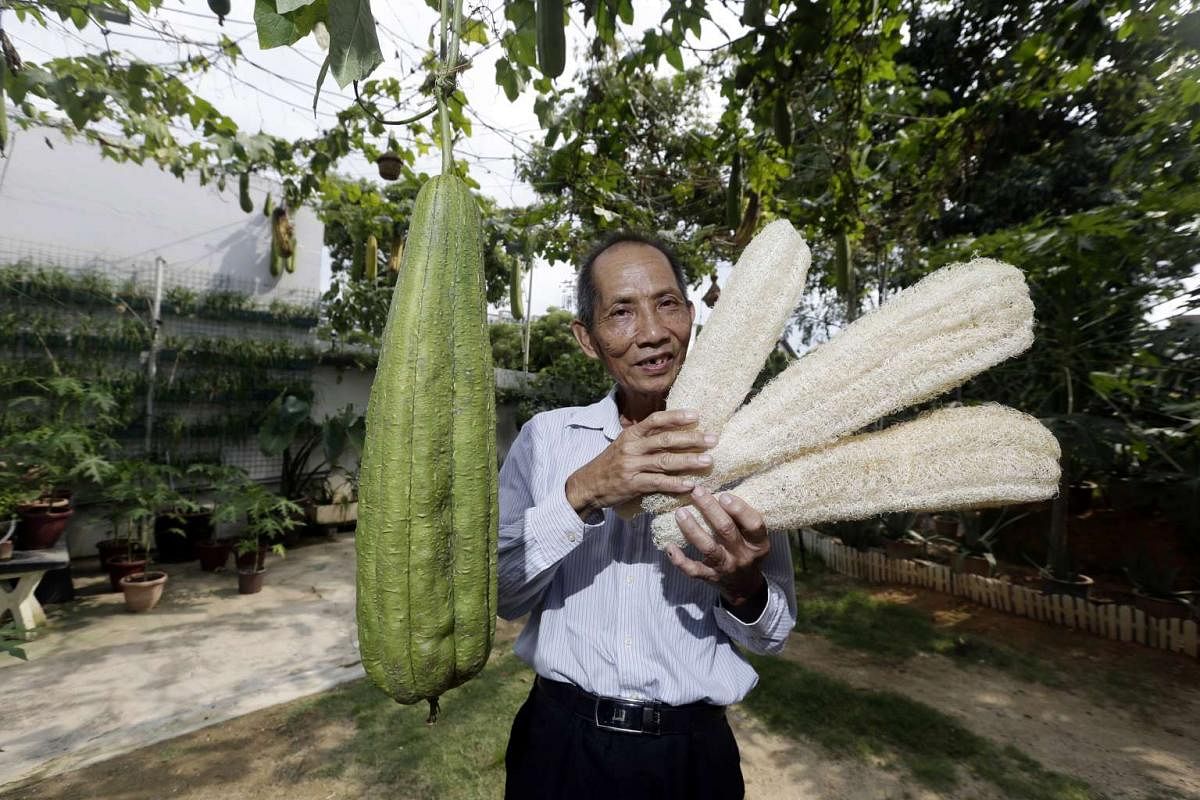In Hebei, Mr Heng had started reading up on the medicinal properties of various plants and herbs, and was convinced that he needed to start growing his own at home.
But home here was a four-room flat in Tampines that he then shared with six others - his mother, wife, three grown-up sons and a daughter-in-law.
"I knew I needed my own space and time to recuperate. I needed a calm environment and did not want to be a burden to my family members," he says.
He contacted a friend, who was happy to rent out his semi- detached house in Bedok for a sum that Mr Heng declines to disclose. His children help to pay his rent.
There, he got to work.
He started out with medicinal herbs and plants. After growing these successfully, he decided to take things a step further and grow his own vegetables.
"Whatever I want to eat, I grow," he says, flashing a toothy smile.
Kailan, lettuce, spring onions, chives, celery, tomato and yam soon made their entrance.
Later on, Mr Heng, who was also a former seafood chef, decided he would again put his culinary skills to good use by rearing fish such as snakehead, parrotfish, grouper and tilapia for his own consumption.
Six years after his mini farm was born, a friend gave him some loofah seeds in 2011.
After some trial and error (he read many books and consulted the Internet), he was able to grow loofah up to 1m long and 3kg in weight.
His take is that his organically grown loofah are best eaten about 20 days after the pod grows into a gourd-like shape.
After about 35 days, the fruit is no longer edible because it hardens into a fibre-filled seed pod.
But that is where the loofah becomes useful in a different manner.
These fibres are used to make commercially sold loofah sponges and scrubs, he says.
As his loofah grew in number - he now has five loofah plants and each can bear up to 60 fruit - and the vines multiplied to form a visually stunning network overhead, Mr Heng started attracting attention.
"People started asking me what these gourd-shaped things are and would stop outside my gate to chat with me," he says.
Social entrepreneur Shelley Siu, 72, is one of them. She moved into Chempaka Estate last year. Her home is less than a five-minute walk away from Mr Heng's rented property.
She initially thought he was growing giant mangoes. "I was curious. I U-turned, stopped at his gate and was amazed to see these huge green and brown fruit miraculously suspended by thin stalks," she recalls.
That spur of the moment stop became a 30-minute chat and Ms Siu was inspired after their meeting to make Mr Heng known.
"How could this man be so quietly growing these wonderful things here?" she says. "I had to tell others about this loofah king I met."
Indeed, fellow neighbour and housewife Padhu Chugani, 57, says she has been living in the Chempaka Estate for more than 30 years and never knew about Mr Heng until Ms Siu told her about him.
Ms Siu signed Mr Heng up with HortPark's Gardeners' Day Out, a monthly activity by National Parks Board, where he sets up a stall to sell loofah plants and dried loofah.
He has also joined Chempaka In Bloom, a community gardening group chaired by Ms Siu. He shares his farming tips and sometimes whips up some loofah dishes for the group.
Some of his creations include organic loofah stuffed with crab meat and shrimp, superior organic loofah soup with dried scallops and tofu, and stir-fried organic loofah with eggs and fresh prawns.
Mr Heng, who seldom eats out, says he is happy to share his newfound knowledge about farming and gardening.
"Growing my own food has benefited my life," he says.
He heads back to his Tampines home for meals two or three times a week and cooks for his family when they visit him about once a week. With his nose cancer in remission, he intends to continue to work at his mini farm.
Each day, he spends two hours in the morning and an hour in the evening tending to it. The rest of the time, he goes out with friends, reads and sometimes goes fishing.
He is in the midst of making space on his second floor to grow more produce, such as organic mini pumpkins. In fact, some of his neighbours have given him various seedlings, hoping that these will thrive under his tender loving care.
He has already succeeded in helping Ms Siu grow white bittergourd plants from seedlings and they are now waiting for them to bear fruit.
"He clearly has green fingers," she declares.
One can hardly believe that the flourishing space that Mr Heng now calls his mini farm used to be a barren, empty piece of ground.
"When I look at my home-grown, mini farm, I am filled with a great sense of satisfaction. Everything that you see here can be eaten and used. Nothing goes to waste," he says proudly.




